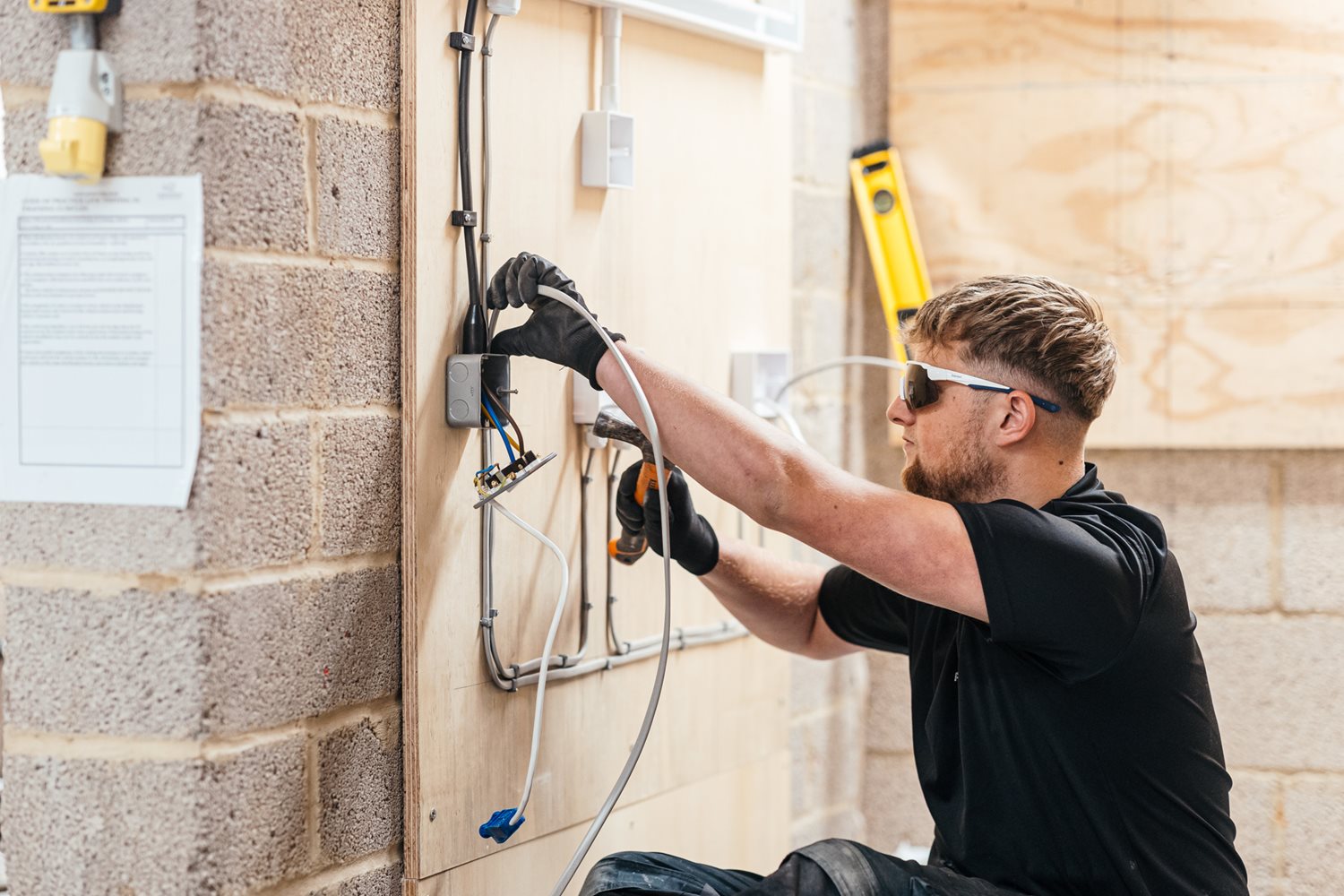At NICEIC, we believe investing in apprenticeships is key to resolving the skills shortage. Here’s how NICEIC is contributing to that conversation.

As the UK creeps closer to its net zero deadline, the role of electricians in the shift towards decarbonisation and electrification has never been clearer.
Apprenticeships, which have long been the favoured route into the industry, are key to ensuring there’s a sufficient pipeline of skilled professionals to deliver the extensive infrastructure upgrades, retrofitting, and electrical work required to meet the UK’s ambitious targets. But with only 7,540 apprentices starting each year – significantly down on the 10,500 needed annually to stabilise the country’s electrical workforce and replace those leaving the industry, according to training provider JTL – a growing shortfall is emerging.
NICEIC research reveals challenges with apprentice recruitment and retention
Last year, to coincide with National Apprenticeship Week, NICEIC conducted research with certified businesses to understand some of the factors contributing to low electrotechnical apprenticeship starts and identify some of the challenges businesses face when it comes to apprentice recruitment and retention.
Concerns about government funding (cited by 49% of firms) and the work-readiness of some apprentices (43%) were highlighted as major barriers to apprentice recruitment in the report. And (17%) also pointed to difficulties with actually finding apprentices in the first place.
On the other side of the coin, research jointly published by UCAS and the Sutton Trust reveals that many students don’t pursue apprenticeships because they simply can’t find one. Three in five (61%) former applicants said they couldn’t find an appropriate opportunity in their area, while 35% said a lack of roles in their chosen career prevented them from securing an apprenticeship.
Combatting the skills shortage: what’s being done
The skills shortage across the electrotechnical and wider construction industry has received a great deal of attention from both government and industry stakeholders over the past few years.
Government initiatives
In March 2025, the Chancellor’s spring statement introduced increased funding for training and skills in the construction sector, with a raft of measures including:
- funding for employers of £2,000 per foundation apprentice they take on and retain
- fully funded training costs through the new Growth and Skills Levy.
£100 million in government funding, alongside £32 million from the Construction Industry Training Board (CITB), was also announced to support over 40,000 industry placements each year for Level 2 and 3 learners studying NVQs, BTECs, T-levels, and advanced apprenticeships.
Furthermore, the apprenticeship standards for both the Domestic Electrician and Installation and Maintenance Electrician apprenticeship pathways were recently updated, with the funding band for the former rising from £15,000 to £19,000 and the latter from £20,000 to £23,000.
There’s still a long way to go, but it’s hoped some of these measures – such as cash incentives for hiring apprentices – will give smaller employers and microbusinesses (which currently employ 80% of apprentices) some additional financial support and encourage those who may have been reluctant to take on an apprentice in the past.
Industry-backed efforts
Stakeholders across the industry are also doing their bit to combat the skills shortage, from lobbying government to introducing tools to make apprentice recruitment easier and quicker for employers.
ECA’s Skills for the Future campaign
The Electrical Contractors Association’s (ECA’s) Skills for the Future campaign highlights three main issues.
- Although crucial to society and the economy, electricians are too often overlooked by policy makers.
- There aren’t enough competent, qualified electricians, an issue compounded by the fact that not enough apprentices are entering the industry.
- The skills pipeline is broken, with only 10% of learners enrolled on classroom-based electrical courses progressing into an apprenticeship.
To combat these issues, the ECA launched its Recharging Electrical Skills Charter at the House of Commons in November 2023, calling for key policy changes designed to close the electrical skills gap and ensure there are enough electricians to support a net-zero future.
The Charter is endorsed by stakeholders across the industry, including NICEIC, the Building Engineering Services Association (BESA), the Electrical Distributors’ Association, the Heat Pump Association (HPA), electrotechnical training provider JTL, the Microgeneration Certification Scheme (MCS), The Electrotechnical Skills Partnership (TESP), Electrical Safety First (ESF), and many more.
Electrotechnical Regional Careers Alliances (ETCAs)
Another initiative launched by the ECA, Electrotechnical Training and Careers Alliances (ETCAs) are now popping up around the country to help increase apprenticeship starts and close the electrotechnical skills gap.
Each ETCA is formed of a group of local ECA members who have all agreed to come together and work with local education providers and other stakeholders to develop a plan of action to improve skills training and careers provision in their local area.
There are now ETCA teams for Greater Manchester, Cheshire and Warrington, Cambridgeshire and Peterborough, and Kent and Medway.
TESP’s ‘Rogue Trainers’ campaign
The Electrotechnical Skills Partnership (TESP) is a not-for-profit organisation comprising a partnership between the ECA, the Joint Industry Board (JIB), National Electrotechnical Training (NET), SELECT (the largest Scottish electrotechnical trade association) and Unite the Union.
Their Rogue Trainers campaign is designed to help individuals enter the industry with the right qualifications to set them up for success. It warns against ‘rogue trainers’ who offer expensive short courses or training packages that leave trainees out of pocket and with qualifications that aren’t recognised by the electrical industry and without the full range of skills they need.
The campaign’s aim is to ensure those who do enter the industry do so properly, with the qualifications and skills they need to become competent members of the electrotechnical workforce.
Connected Futures: the electrotechnical job board from NICEIC
From our own research (referenced above), we understand the issue of low apprenticeship uptake in the electrotechnical industry is a complex and multi-faceted one.
For businesses, a perceived lack of funding, red tape, and behavioural concerns are just a few of the factors that can make the prospect of hiring an apprentice an unappealing one.
On the flip side, many potential apprentices aren’t equipped with the technical and soft skills they need to make themselves attractive to the businesses they’re applying to. Moreover, many of them simply don’t know where to start, or how to identify and approach local businesses who are open to taking on an apprentice.
And that is the piece of the puzzle NICEIC has stepped in to solve – helping businesses and candidates find each other in the first place.
Connected Futures, the exclusive new electrotechnical apprenticeship job board from NICEIC, is designed to remove some of the faff and connect NICEIC-certified businesses directly with apprenticeship candidates in their area.
Completely free to use for both NICEIC-certified businesses and apprenticeship candidates, the platform allows candidates to upload their CVs and apply for suitable apprenticeship opportunities posted by NICEIC-certified businesses in their area. Businesses can then directly contact suitable candidates and keep track of where they are in the application process, all in one place.
To find out more about Connected Futures visit our dedicated webpage. Or, to register your busines and sign up now, visit futures.niceic.com. Let’s work together to close the skills gap and attract new talent into the electrotechnical industry.






